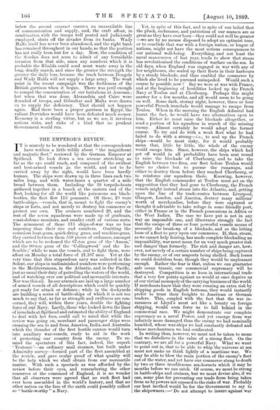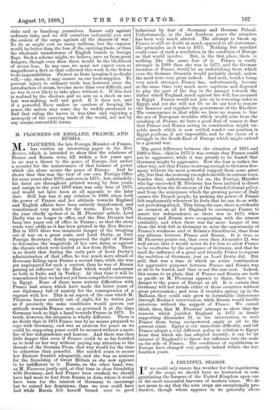THE EMPEROR'S REVIEW.
IT is scarcely to be wondered at that the correspondents have written a little wildly about "the magnificent and majestic fleet." reviewed by the German Emperor at Spithead. To look down a sea avenue stretching as far as the eye could reach, and composed of the swiftest and best-armed vessels in the world, and not to–be carried away by the sight, would have been hardly human. The ships were drawn up in three lines each two miles long, and with water-lanes a quarter of a mile broad between them. Including the 38 torpedo-boats gathered together in a bunch at the eastern end of the fleet, looking for all the world like poisonous sea black- beetles, the fleet flew 113 pennants. Of these, 20 were battle-ships,—vessels, that is, meant to fight the enemy's ships or forts, and not merely to destroy his commerce or protect our own. The cruisers numbered 29, and the rest of the seven squadrons were made up of gunboats, coast-defence monitors, and smaller craft of various sorts. The armament of these 113 ships-of-war was no less imposing than their size and numbers. Omitting the countless boat-guns, quick-firing guns, and machine-guns, they carried between them 558 pieces of ordnance, amongst which are to be reckoned the 67-ton guns of the Anson,' and the 80-ton guns of the Collingwood ' and the In- flexible;' while to man the vessels, and to fight them, were afloat on Monday a total force of 21,107 men. Yet at the very time that this stupendous navy was collected in the Solent, our ships in undiminished numbers were performing in the Mediterranean, in the Atlantic, and in the Pacific, just as usual their duty of patrolling the waters of the world, and of watching over our political and mercantile interests. Nor was this all. In our arsenals are laid up a large number of armed vessels of all descriptions which could be quickly got ready for attack or defence ; while in the dockyards are building a series of battle-ships of which it is not too much to say that, as far as strength and swiftness are con- cerned, they will, within three years, double the fighting force of our Navy. Lastly, those who looked down the lines of ironclads at Spithead and estimated the ability of England to deal with her foes, could call to mind that while the review was going on, merchant and passenger ships were crossing the sea to and from America, India, and Australia which the thunder of the first hostile cannon would turn into auxiliary war-vessels, ready to aid in the work of protecting our country from the enemy. To re- mind the spectators of this fact, indeed, the superb Teutonic '—an ordinary mail steamer, but built under Admiralty survey—formed part of the fleet assembled at the review, and gave ocular proof of what quality will be the help which we shall obtain from our mercantile marine. With such a spectacle as was afforded by the review before their eyes, and remembering the other resources at the command of England, it is no wonder that all observers were agreed that no such fleet had ever been assembled in the world's history, and that no other nation on the face of the earth could possibly collect so " battle-worthy " a Navy. Yet, in spite of this fact, and in spite of our belief that the pluck, endurance, and patriotism of our seamen are as great as they have ever been—they could not well be greater —we are by no means disposed to adopt an optimist tone, or to conclude that war with a foreign nation, or league of nations, might not have the most serious consequences to our national well-being. Everything, and not least the naval manceuvres of last year, tends to show that steam has revolutionised the conditions of warfare on the sea. In old days, when England was engaged in war with any of her neighbours, she sealed up their fleets in their harbours by a steady blockade, and thus enabled the commerce by which she lived to be pursued unimpeded. Would such a course be possible now ? Say we were at war with France, and at the beginning of hostilities locked up the French Navy at Toulon and at Cherbourg. Perhaps this might answer for a few months, and all would seem to be going on well. Some dark, stormy night, however, three or four powerful French ironclads would manage to escape from Toulon. When in the morning the English Admiral had learnt the fact, he would have two alternatives open to him. Either he must raise the blockade altogether, or send a portion of his squadron in search of the missing enemy. Almost certainly he would adopt the former course. To try and do with a weak fleet what he had failed to do with a strong—i.e., to seal up the French ships--would be most risky, for it would probably mean that, little by little, the whole of the enemy• would escape him. Since, however, the ships which had got off would in all probability have been sent round to raise the blockade of Cherbourg, and to take the English between two fires, our fleet before Toulon would have no choice but to pursue the runaways, and either to destroy them before they reached Cherbourg, or to reinforce our squadron there. Knowing, however, that the English commander at Toulon must act on the supposition that they had gone to Cherbourg, the French vessels might instead steam into the Atlantic, and, getting upon the line of the trade-routes between Liverpool, Glasgow, London, and America, destroy many millions' worth of merchandise, before they were captured or thought it advisable to take refuge in some friendly port, either in France or in the French possessions in Africa or the West Indies. The case we have put is not in any way an impossible one, and illustrates strongly the fact that the escape of three or four powerful vessels means of necessity the break-up of a blockade, and so the letting loose of a fleet to prey upon our commerce. If, then, steam, as we cannot help fearing, has made complete blockading an impossibility, war must mean for us very much greater risk and danger than formerly. The risk and danger are, how- ever, not merely of a certain number of ships being captured by the enemy, or of our seaports being shelled. Such losses we could doubtless bear, though they would be unpleasant enough. Rather the fear is that, unless we can guarantee safe ocean transit, our commercial supremacy will be destroyed. Competition is so keen in international trade that a very few points against us would at once deprive us of our virtual monopoly of the carrying business of the world. If merchants knew that they were running an extra risk by shipping goods in English bottoms, they would. instantly prefer to trust their freights to American or German traders. This, coupled with the fact that the war in- surances at Lloyd's must act like a bounty on foreign shipping, would soon force us to fall behind in the commercial race. We might demonstrate Our complete supremacy as a naval Power, and yet emerge from war infinitely more damaged than the enemy we had nominally humbled, whose war-ships we had constantly defeated and whose merchantmen we had confiscated.
In writing thus, however, we must not be taken to mean that we disbelieve in the value of a strong fleet. On the contrary, we are all for a powerful Navy. What we want to point out is, that to be able to whip the universe at sea must not make us think lightly of a maritime war. We may be able to blow the main portion of the enemy's fleet out of the water, and yet have our commerce stung to death by two or three troublesome sea-hornets which it may be months before we can catch. Of course, we must be strong in battle-ships and cruisers, but we must devise also, if we can, some plan for preventing our trade from being taken from us by powers not exposed to the risks of war. Probably our best method would be for the Government to say to the shipowners Do not attempt to insure against war risks and so handicap yourselves. Insure only against ordinary risks, and we will ourselves indemnify you and the owners of the cargo against all the chances of war.' To do so might cost us many millions, but the expense would be better than the loss of the carrying trade, or than the wholesale transference of English vessels to foreign flags. Such a scheme might, we believe, save us from great dangers, though even then there would be the likelihood of severe loss. In any case, we must not expect even so magnificent a fleet as that collected this week in the Solent to do impossibilities. Protect us from invasion it no doubt will,—nay, more, it may ensure us our food-supplies. To prevent injury to ordinary trade has, however, since the introduction of steam, become more than ever difficult, and no war is ever likely to take place without it. If this fact is realised by the electors, and so acts as a check on use- less war-making, well and good. If it does not, and if a powerful Navy makes us careless of keeping the peace, the nation may some day be rudely awakened to find that ruling the waves in war-time and enjoying a monopoly of the carrying trade of the world, are not by any means convertible terms.



































 Previous page
Previous page